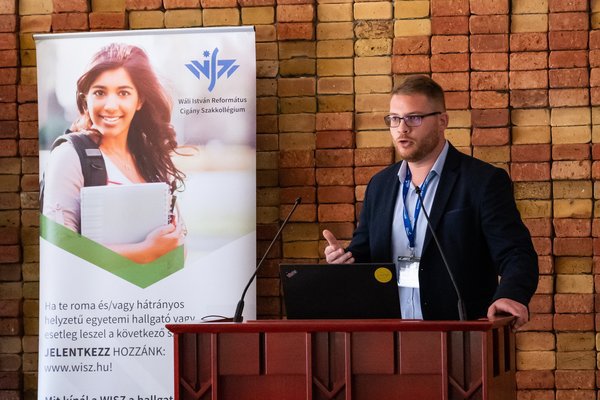When it comes to the spiritual life of a community, it is hard to imagine it without personal encounters. However, at the Wáli István Reformed Roma Special College (WISZ) in Debrecen, community life took place in the digital space during the days of lockdown. Márton Lovász, pastor of WISZ, spoke about the spiritual and social proximity even against physical distance and the challenges of the second part of the school year.

If you had to describe the last school year of WISZ with one word, which one would it be?
Blessing. Gratitude also came to my mind, but I picked blessing because in the first semester, for the second time, we have experienced a relatively large number of new students entering the college. All this had a very positive effect on the WISZ community and further strengthened the team spirit. The team became more cohesive, which we clearly felt in every aspect of the college life. When I think of the spiritual life, I can repeat the same. We have been able to raise the attendance of bible classes and prayers way beyond the “obligatory minimum”. We have felt God’s blessing all along, during the lockdown, just like in the weeks we could be physically together. Moreover, during the emergency, I experienced a more consciousness as to how students did care for each other and the community as a whole.
How did you personally experience this period?
There were ups and downs. The lack of personal encounters was depressing, and the milieu of online platforms and conversations was completely different from the usual way of being connected. After a while I even noticed that I got more impatient and stressed. Looking back, however, I think it was reassuring for me to switch to online platforms and home office.
How did you manage to “digitalize” the spiritual life of WISZ? What challenges did you face and what joys did you experience?
First I had serious concerns as of how the digital communication and online events would work, whether, for example, 20-25 people could handle a given interface during a shared conversation? It turned out that they could. Turning the microphones on and off often caused excitement, though, and using video slowed down the connection. I highlight these moments because they show that the personal, physical encounters are different from the “webcam” meeting. Spiritual life, therefore, spontaneously became different, not so much in its quality, but more regarding its form. Several students expressed this and they also regretted, for example, that they couldn’t meet in person at the National Roma Prayer Day in April. Still it was an encouraging experience for them to join the meeting and prayer online.
Wandering Community
International Roma Prayer Day in the Shadow of the Pandemic. After seven years of observing the International Roma Day on April 4 as a festive gathering and a day of joint prayer of Roma and non-Roma alike, RCH’s Roma Ministry invited congregation to a virtual pilgrimage of prayer and praise.
Personal conversations were also influenced by the unprecedented situation. We could see and listen to each other, which was a blessing, still it could not replace face to face encounters. Nevertheless, I believe that we have been able to make the most of the opportunity.
Have you adapted the Bible lessons and prayer sessions to the virtual reality, if yes, what has changed?
Actually, yes. As a new element, initiated by the students themselves, we included in our sessions the so-called “circle of gratitude”. Participants have been invited to give their reason for the gratitude they have in their heart on that day. Listening to terrifying news all the time, confronted with all the questions and uncertainties, sharing our gratitude helped me and the students a lot in staying positive. It is always a source of strength, when we discover and count the blessings we can be thankful for in our lives, and this is even more true in such a situation. We will keep this new element of our bible groups when we are going to meet physically.